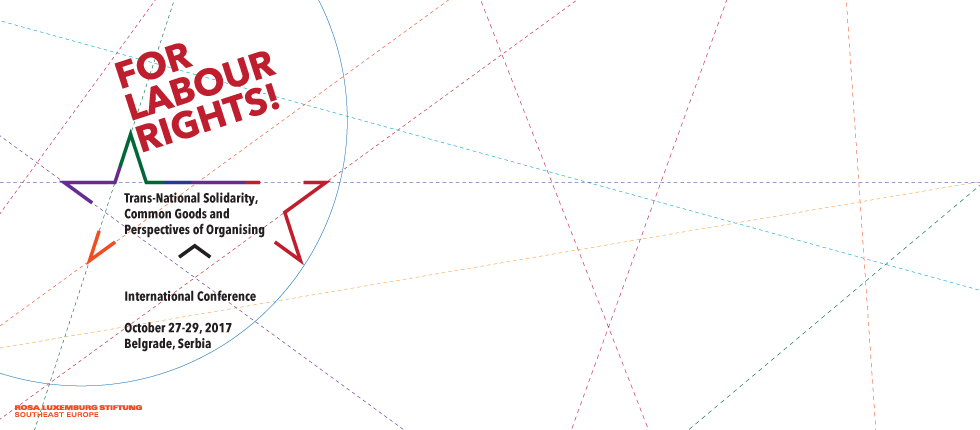«FOR LABOUR RIGHTS!»

The conference focus is organised around three key topics:
- building transnational labour solidarity;
- organising and campaigning in the public sector;
- reaching un- and under-organised workers – mainly young workers who haven’t yet had an opportunity to unionize/get unionized, but also other classes of workers with precarious employment arrangements.
The conference programme will open with a public event which aims to discuss the concept of «Global Social Rights» on a general level, and also present to the general public the basic concepts, facts and histories pertinent to this topic. Furthermore, it intends to tackle questions of organising and campaigning in the public sector. While closely following the given specific situations in each country, the public sector is under constant pressure to be privatised and to become more ‹competitive› – which means nothing other than to actively take part in the capitalist logic of profit-maximising. The everyday consequences of this for the largest sections of every society are numerous and disparate. One obvious negative trend is that the prices of certain common goods are rising – the energy industry is one very recent example of how private providers develop strategies to completely bypass the state and the common interest of every society in maintaining reasonable energy prices. In Serbia, for example, the citizens of Niš organised a large protest movement against the high electricity prices. Another example is the health system which is – similarly to the energy sector – constantly under strong pressure to privatise. The arguments of those pushing the privatisation agenda include: the inevitability of austerity measures, the higher quality of medical care (this refers to: no waiting, the greater availability of diagnostic procedures, a broader range of available diagnostic procedures, more time dedicated to each patient by medical care providers, friendlier and more motivated staff), and a higher level of transparency. In practice this leads, in opposition to the advocates of privatisation, directly to a two-class medical care system in which a small number of wealthy people are able to enjoy medical benefits, while many in society are left unable to pay for any kind of quality medical care. In Croatia, for example, a long-standing dispute is running over the possible privatisation of the ‹Imunološki zavod› – a central state-owned medical institution which deals with the production of vaccines and other immunological products. On a more general level, the hegemonic neoliberal discourse constantly tries to antagonise the labour forces working in the public and private sector. One of the key arguments is the thesis that working people in the public sector are lazy and well paid, while those in the private sector are diligent, but underpaid. It is certainly true that workers in the private sector are overloaded with work and underpaid, but the socio-economic position of employees in the public sector is everything but secure. The logic behind this invention of an inherent social clash between private and public is, first, not oriented towards a strategy to increase wages and living conditions for those employed in the private sector, but to decrease standards for those employed in the public sector. Second, this ideological trick leads to a decline in solidarity and relocates the socio-economic struggles from the materialistic binary of ‹work› and ‹capital› to an inner-working class binary. The consequences are tangible, resulting in increasing difficulties with organising the working class through common socio-economic interests, with practicing solidarity and with developing counter-hegemonic approaches to the preservation of good public services on the one hand, and to overcoming the exploitation of workers in the private sector on the other hand.
